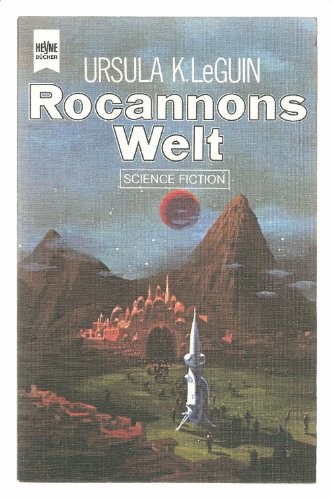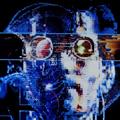Ansible—the open-source “infrastructure as code” tool—borrowed its name from this novel.
In the story, an ansible is a faster-than-light (FTL) communication device—words typed on one ansible appear instantaneously light-years away.
This factoid was chief among my reasons for reading this book.
I also read it for completeness sake—“Rocannon’s World” is the first novel in the Hainish Cycle—Ursula K. Le Guin’s epic future history, which includes one of my all-time favorite books: “The Dispossessed.”
But this was my least-favorite Le Guin story I’ve read thus far (although that’s a high bar).
The story was nothing more than your average 1960s sci-fi/bronze-aged castles with flying cats mashup.
While that sounds exciting, the actual book was slow.
There needed to be more plot for such a plot-driven story.
Plot
I ride with Olhor, who seeks to hear his enemy’s voice, who has traveled
through the great dark, who has seen the World hang like a blue jewel in the
darkness.
– Ursula K. Le Guin, "Rocannon's World"
The novel opens with an explosion. The eponymous Rocannon's ship is destroyed by
an unknown enemy.
Rocannon (later: Olhor) is an ethnologist of high-intelligence life forms for
the League of All Worlds. The League is studying a bronze-age civilization on
an unnamed planet orbiting the star Fomalhualt.
The League has managed to catalog three of the five (maybe) species of the
planet:
- Gdemiar – dwarves, effectively, who live underground and have telepathy
among their own kind.
- Fiia – elves, effectively, who are small and slight and have telepathy
among their own kind.
- Olgyior/Angyar – one species divided into two classes.
- The Olgyior are dark-haired, light-skinned serfs.
- The Angyar are dark-skinned, yellow-haired high-borns.
As Rocannon explains his ship-explosion troubles to Lord Mogien of Hallan
Castle—a high-born Angyar—they cross paths with a lone Fiian. The Fiian
reveals his whole village was also decimated by the enemy.
Bound by their common enemy (and the Angyar's unexplainable "All for One"
philosophy), Lord Mogien, Rocannon, and Kyo the Fiian join with three of
Mogien's Olgyior servants on a quest to the unknown and uncharted South in the
hopes of sending a distress signal to the League from the enemy's ansible.
Semley's Necklace
The story opens with its best part: "The Dowery of Angyar" (AKA, Semley's
Necklace), which was published as a stand-alone story in 1964, two years before
the publication of Rocannon's World.
This prologue is a reimagining of Freyja's Brísingamen necklace of Norse
Mythology.
The eponymous Semley, a high-born Angyar, is attempting to track down a
family heirloom—the sapphire necklace known as the "Eye of the Sea."
She seeks out the Gdemiar (dwarves), who made the necklace, who agree to take
Semley to meet the necklace's new owners—the Starlords, who include a young
Rocannon.
The journey teaches us all about time dilation and the deleterious effects of
near-FTL travel.
This prologue has all the best parts of the novel and none of the slow,
slightly dull, ungainly attempts at character development—highly recommended.




